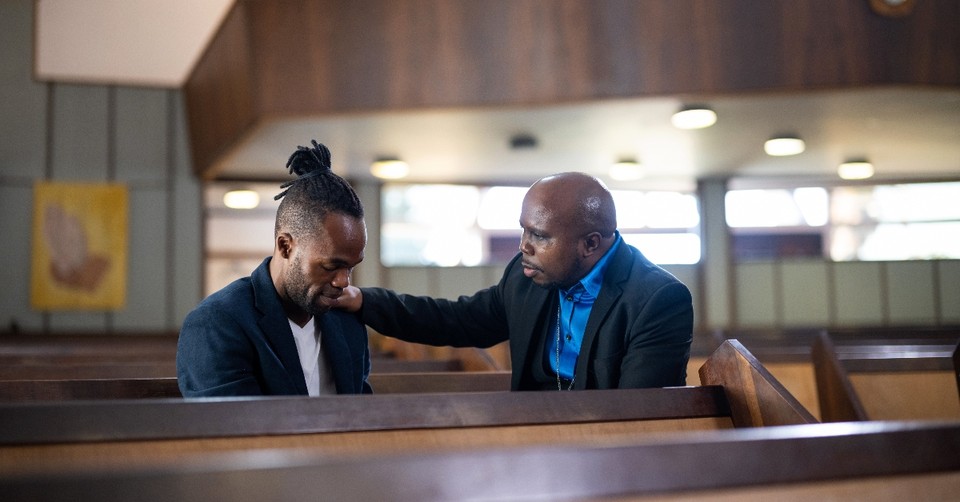3 Questions to Help the Church Address the Issue of Toxic Masculinity

Masculinity is something to be celebrated and honored, and that’s not something we hear in secular culture, but it’s biblical. The book of Genesis (1:27) is clear that males were created in the image of God - and God is Spirit (John 4:24), and God is Love (1 John 4:8). Our inner selves - heart, mind, and soul - were intended to reflect the Lord’s glory, as distinctively created men. In the same way but with a different outcome, our co-pilots are distinctively created women.
Let’s address this issue of toxic masculinity by looking at three questions regarding the definition of masculinity, toxicity itself, and accountability.
What Is Masculinity?
Integral masculinity remembers that women are called equally to share the divine honor of creation: “When God created mankind, he made them in the likeness of God. He created them male and female and blessed them” (Genesis 5:1-2). At the heart of the question, “What exactly is a man?” is a mystery, akin to the answer God gave Moses when he asked, ‘Who are you?’ God simply answered, ’I am who I am.’ The manliness in a man is purposefully enigmatic, which reflects God because, in His loving shadow (‘tzelem Elohim in Hebrew), the first man was made. The Lord then forged a woman from the first man’s rib, and that woman, in turn, birthed descendants, both men and women. This has been a dynamic of generating, sustaining, and serving each other, which originates from God-is-love himself. The relationships in their current form, therefore, serve God’s purposes until Jesus returns.
Men are called to show masculinity in the form of servant leaders, following the example of Jesus and reflecting God’s love in their dealings with women. Toxic masculinity, an evil result of the fall, seeks to disempower women of this right to be valued, even though this principle of care was reinforced by the blood of Christ. In that respect, integral masculinity - manliness with integrity - is the opposite of toxic masculinity. The latter can also poison the interests of church communities in the same way that toxic feminism causes problems in opposition to integral feminism (but that’s for a different article).
The foundation for both sexes is Bible-based kingdom values, including an understanding that our genders are temporal states within God-ordained evolution, starting from the earthly bodies as seeds anticipating the fruit of heavenly bodies. One day, we will become like the angels (Mark 12:25), and we should be mindful that our eternal bodies will differ from our temporary bodies. Men and women of integrity respect God’s order here and now, but their primary focus is simply living as children of God: ‘So in Christ Jesus, you are all children of God through faith, for all of you who were baptized into Christ have clothed yourselves with Christ. There is neither Jew nor Gentile, neither slave nor free, nor is there male and female, for you are all one in Christ Jesus’ (Galatians 3:26-28).

Photo Credit: ©iStock/Getty Images Plus/cyano66
What Is Toxicity?
Another month, another national story about a male church leader being reprimanded for adultery or controlling behavior. It gets tiring seeing this again and again. And it happens for a very simple reason - no accountability. A pastor who refuses to be properly accountable to other God-loving people does not deserve the privilege of being a pastor.
Church leadership should never be about one person either - apart from Jesus Christ. The Book of Acts is clear that the first churches were led by elders with deacons, all with different gifts such as pastoring and teaching. That structure helps accountability because the focus of the church is on the community under the leadership of the Holy Spirit, rather than focusing on a single fallible man trying to lead the church and tempted to swap humility to build a personal power base in a form of toxic idolatry, which tramples on the welfare of others.
What Is Accountability?
The Bible (1 Timothy 3:2-10) is clear about the qualities of accountability for church leaders: to be “above reproach, faithful to his wife, temperate, self-controlled, respectable, hospitable, able to teach, not given to drunkenness, not violent but gentle, not quarrelsome, not a lover of money. He must manage his own family well and see that his children obey him, and he must do so in a manner worthy of full respect. (If anyone does not know how to manage his own family, how can he take care of God’s church?) He must not be a recent convert, or he may become conceited and fall under the same judgment as the devil. He must also have a good reputation with outsiders so that he will not fall into disgrace and into the devil’s trap.
“In the same way, deacons are to be worthy of respect, sincere, not indulging in much wine, and not pursuing dishonest gain. They must keep hold of the deep truths of the faith with a clear conscience. They must first be tested, and then, if there is nothing against them, let them serve as deacons.”
These sound like ‘rules’ and we can avoid them out of fears of legalism. But they are wise guidelines for healthy, wanting-to-grow churches, ensuring that people of the Light have male leaders who equally live in the Light.
Following these guidelines or principles will ensure that toxicity problems don’t surface in the first place.

Photo Credit: Ben White/Unsplash
World… Meet Colin
Toxic masculinity can only be removed from church if we revisit what it means to be a man in the first place. Kingdom values veer in the opposite direction to the world. Jesus once talked about the weak shaming the wise: “But God chose the foolish things of the world to shame the wise; God chose the weak things of the world to shame the strong” (1 Corinthians 1:27).
Consider how that affects the way men should see themselves. It means that the weak men in the church are honored by God. In fact, they are chosen! Those aspiring to be leaders should remember that. It is by God’s power, and within a context of accountability to his body, the church, that a man progresses to be a leader with integrity.
Colin was a simple man who attended a local church. He was also totally blind. If you looked at him, you’d see a very thin and small man who walked slowly, his body almost cowed over. But… every day, Colin would get out of his house and walk into town. Imagine the bravery needed to do that. Walking totally blind across streets, passing cars, and navigating people. He would walk past muscular, rugged, handsome men. He felt his way from shop window to shop window, tapping a cane on the ground and listening intently. He looked too thin, awkward, and even limp, and yet the sharpness of his will blazed with true manliness. He was courteous, polite, and meek. That man was a true warrior. That man showed true masculinity. He walked by faith, leaning on God’s strength and not his own.
Jesus himself (Isaiah 53:2) had ‘no beauty or majesty to attract us to him, nothing in his appearance that we should desire him.’ And we should remember what God says in 1 Samuel 16:7 when talking to the prophet about Saul: ‘But the Lord said to Samuel, “Do not look on his appearance or on the height of his stature, because I have rejected him. For the Lord sees not as man sees: man looks on the outward appearance, but the Lord looks on the heart.”
The first step to removing toxic masculinity is, therefore, understanding what masculinity means from a biblical perspective.
Church Men Similarly Need to Step Out in Faith And…
We can’t spend our lives trying to judge men by saying that’s toxic or that’s not. It is far better to focus on building the church by ensuring men are accountable in the first place, under the mentorship of wise father figures and an emphasis placed on integrity in the walk of faith, weak as we are, relying on Christ.
A wider problem is perhaps that men’s ministry is not taken seriously by some churches. There can be an occasional restaurant meal or sports event, but little time is spent meeting together for intense, loving discipleship, as Jesus did with the apostles. Maybe if we prioritized men’s discipleship as a key church ministry, it would remove toxicity and have a positive ripple effect on the wider kingdom, blessing and building families, fellowships, and communities.
Photo Credit: ©iStock/Getty Images Plus/PixelCatchers
Christopher Eyte lives with his wife Céline and three children in Swansea, Wales, UK. He has worked as a journalist for many years and writes his own blog (hislovefrees.life) encouraging others in their walk with Jesus. He became a Christian in February 2002, after a friend explained God's amazing grace!
Originally published October 18, 2024.







